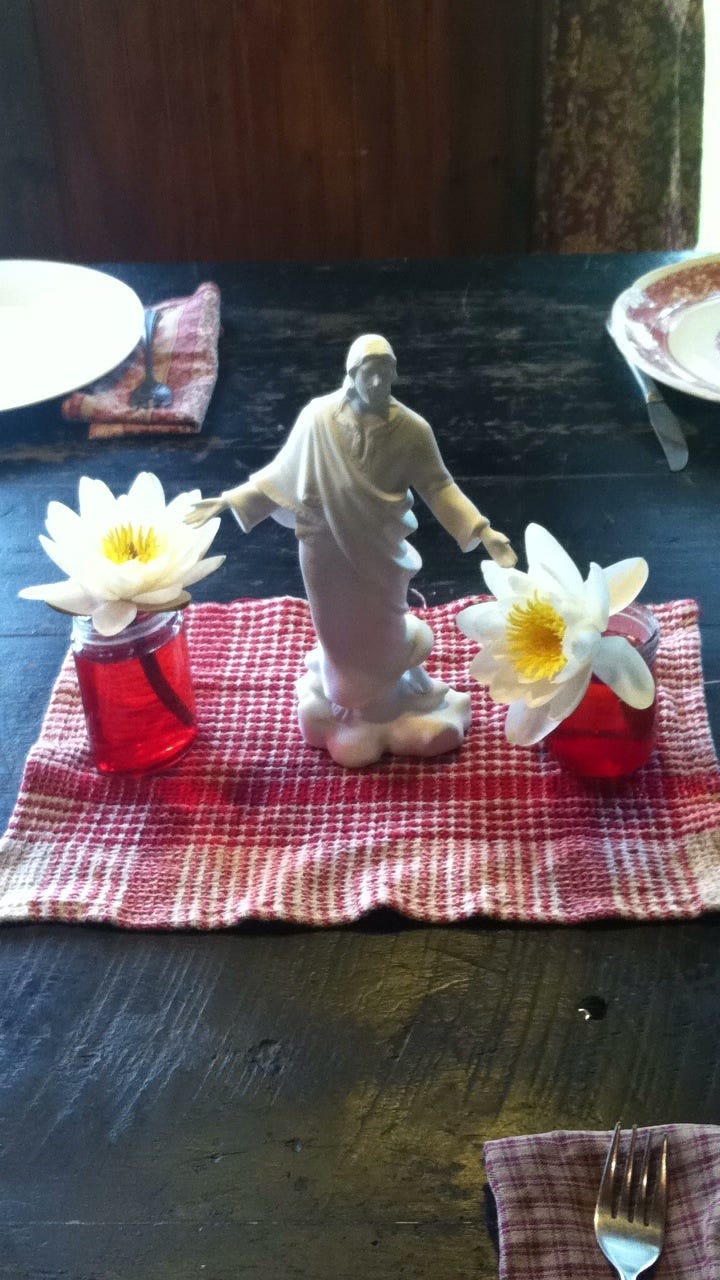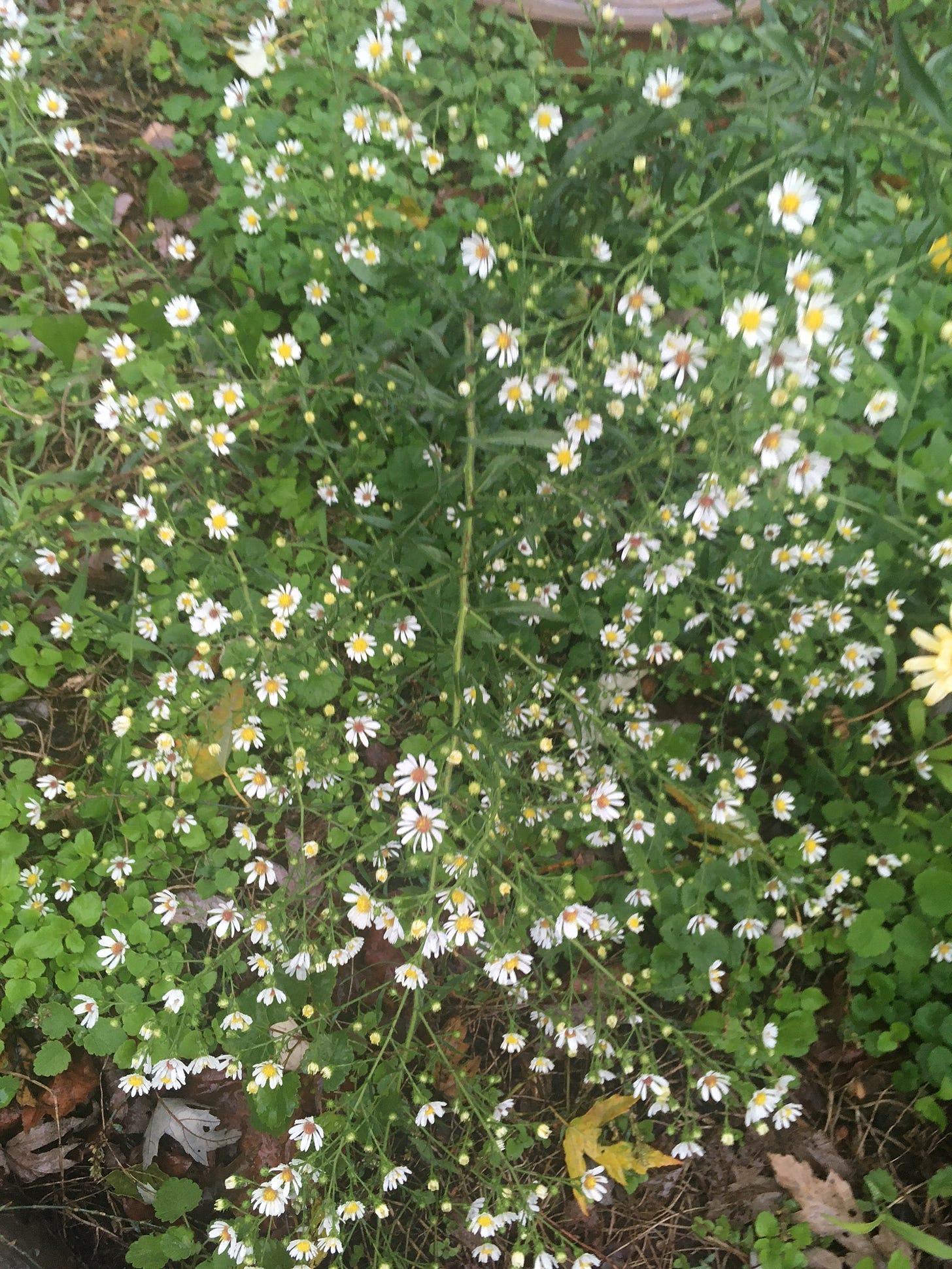Poverty: the Crucial Foundation
All talk of a culture of life is fruitless if we don't confront and embrace it.
“Blessed are you who are poor,
for yours is the kingdom of God.”
Christ in Luke 6:20
No one likes to be told what to do with their money. It cuts at the heart of our human selfishness, and money in a marriage may not be the root of all evil but it is frequently the source of many fights.
For men who are husbands and fathers in the middle and lower class, the need for money is the inescapable reality, and it’s impossible for them to feel their families are safe and flourishing without it. I’ve met men who were completely detached from money, but they were all single. For men, getting married means shouldering the yoke of producing enough money to keep their wives secure and their children flourishing.
I began experiencing the attraction of what’s called apostolic poverty when I was single, but when I married, my husband pointed out to me that eschewing worldly goods wasn’t going to be so easy for him, since his job as provider was to supply us with worldly goods. In this, I recognized that as a woman and wife, if I truly wanted to embrace detachment, I could not be demanding worldly goods from him.
This is difficult, because of the five components that women need to fall in love with someone, financial security is one.
Money is inescapable in this modern American society where I have lived all my life, and like a permeable gas, it seeps through the crevices of any membrane of piety or apostolic work. Every apostolate must be framed as a business proposal, every cultural endeavor must be squeezed into the box of financial cost, as though that were the most decisive issue. As the Second Vatican Council observed, “many people, especially in economically advanced areas, seem, as it were, to be ruled by economics, so that almost their entire personal and social life is permeated with a certain way of thinking.” (Constitution on the Modern World)
This “economic way of thinking” can build you a house, even a mansion, but it is a house with no doors or windows for escape. No matter how hard you search for a crack away from its material omnipotence, you cannot escape its benevolence, its standards, its evaluation. This is the world we wanted: a comfortable and comforting world, with material relief always within our reach, and we seem to have gotten our wish, but it has turned out to be the wish of Midas. It is us we have made into a golden statue, unable to think or imagine apart from its standard. A world that can be objectified, philosophically or scientifically, can be price-tagged, and the grime and the gum of the price tag has turned out to be the greater annoyance. It can never be fully removed from our thoughts.
But yet Christ calls us, and we who desire to follow Him long to step away from the tax table of our invested concerns, as did the apostle and Gospel-writer Matthew, and follow Him on this tremendous adventure. Is it even possible?
Right now, I live with my husband and assorted children on a homestead at the foot of the Massanutten Ridge of western Virginia, and we struggle to make ends meet, having embarked on an artistic apostolic life some twenty-five years ago when we married. There is a bit of Dickens’ Micawber family in us: we are jolly, enjoy being generous, and find the battle to live within our means a constant discipline, with misery lurking behind the next medical or automobile emergency. We will probably always struggle. Yet somewhere along the way, I saw Lady Poverty, that great love of St. Francis, and I called out to her. And the peace and freedom that came along with her welcome was unexpected and tantalizing. It is about my friendship with her that I will begin this project of culture recovery, and I am convinced nothing much will happen without it.
It’s worthwhile that when Christ began His revolutionary teaching on the new ordering of human life under the gospel, He began with the words, “Blessed are you poor, for yours is the kingdom of heaven.”
All the exegesis to eliminate uncomfortable material choices from these words cannot escape the fact that out of all the luminous foundational phrases He could have begun His mission to humanity with — “love your neighbor,” “love the Lord God” “do unto others…” — He instead chose these words as His beginning, the blessing of poverty. Before meekness, repentance, justice, mercy, purity of heart, and peacemaking He upheld those who are poor, in spirit or otherwise.
From this I am going to deduce that as we seek to live the Gospel in the 21st century, we must begin here. The materialistic trap strangling the world can be eluded if only we learn to love poverty. (Side note to elucidate later: as I am mulling over the China Convergence, it has struck me rather forcefully that Gospel poverty is the means of stepping out of the trap of the managerial regime.)
But what exactly is poverty? I pondered this as I worked with the poor in New York City in the company of Franciscan friars for one year after college. In working with the American poor, I discovered that poverty is not merely the lack of stuff: it’s the lack of any safety nets. If you are poor, you are living from one moment to the next, with nothing to rely upon in the future. There is no bank account, no relations to call upon for help, no government programs, no friends for comfort, if you are truly poor. Day to day life is a struggle, and any trial or suffering can cause a collapse, since there are no resources to draw on.
In America, as Mother Teresa observed, our poor are not those who lack material needs, but those who are lonely. This was definitely true of the poor in the American cities, whose problem was not that they lacked food but that they lacked family and friends. The plight of the single mothers and their neglected children was often the absence of a husband. The first wealth that any of us has is love: spouse, children, mother, father, grandparents, aunts, uncles, extended family. Lack of that is a poverty. Lack of love is a poverty.
Why should we ask for poverty? Do we want to be unloved by family and friends?
Poverty means having no safety net. Poverty means being ineligible for the government program, not qualifying for medical intervention, being overlooked by the professional charity. It means having just the wrong sort of problems that put you between the buckets.
Why should we ask for poverty? Do we want to be deprived of resources and help?
Poverty means not knowing where to turn. It means having the inexplicable illness, the symptoms no one can understand, the addiction that does not respond to treatment, the disease no one can cure. It means being subject to death and loss and desolation.
Why would we ask for something like that? Do we want to be alone with only ourselves and our problems?
Here is why we would:
All safety nets are illusions. In the end, they are not what saves us. The love of a family can’t cure cancer. The government program can’t save your soul. A loving spouse or the best new medication or the most perfect diet can’t cure a self-destructive impulse. There is only one who saves us in the end, and His name is the One Who Saves.
THAT is poverty: the recognition that all our resources, both monetary and human, in the end, can’t buy us happiness or heaven. Everything and everyone will fall short, save God. Recognizing that is the first step towards being poor in spirit and being free from everything that would hold us back from Him.
So why should poverty be the foundation for culture recovery?
To free us from fear of poverty and make us aware of the real enemy. Loss of money, home, and even the love of our children are not as terrible as the loss of our soul. Recognize the real enemy: ourselves. A follower of St. Francis whose name escapes me—St. Giles, I think—startled me by his observation that we spend so much time fearing starvation, kidnapping, terrorism, earthquakes, robbers, and various other things—but none of these things can harm our souls. However, we ourselves can send ourselves to Hell by hatred, greed, and addictions, and yet we are quite comfortable with ourselves and don’t spend much time putting ourselves on guard against ourselves. Why is that? He advises: fear the real enemy, “the one who can cast you into Hell,” and forget these little fears, for nothing else can separate us from the love of God.
To make our hearts truly simple. If Love is our goal, even the most complicated of family obligations and daily routines will eventually help to simplify our hearts. And nothing, neither Legos nor American Girl Doll catalogs nor holiday menu planning nor overgrown August gardens nor wedding guest lists nor dust mites can separate us from the love of God.
To free us from enslavement to our goods, from having to care for them, guard them, worry about them. Modern life conspires towards making productive people exhausted: why spend mental energy worrying about the material excessively? Material things can work a spell upon us which we are subject to, on account of our fallen nature. So potent is this spell that Buddha imagined that freeing oneself from it would enable one to ascend to Nirvana. Material things were made for our use, but too often we are used by them. This must not be.
To make us daringly generous and courageous. We are afraid to be generous, afraid to give when it hurts. We fear those who are poor and fear how they might abuse our charity. Fear of what tomorrow might bring keeps us from sharing when we see a need. Poverty can help us give freely away, even from what we legitimately need and could hold onto. It is the courage to say, “My true treasure is the Lord,” and give away fully, like the widow in the temple praised by Christ. She had legitimate reasons to hold onto those two coins, but in her bravery and generosity, she was able to give the Lord her all.
To help bring about a good and just society. Our economic system does need reform: so much waste is generated and so many people are left behind. Often, we do not have the margin to be habitually generous, and fear of losing our resources causes us to hold onto things we might be called upon to surrender for some great good we don’t yet see. The wealth of ancient Egypt might have seemed to be in the Nile or in the Egyptian people, but it was also in their gold mines. When the gold mines ran out, their civilization collapsed. Should American civilization also run out, what might come about in its wake? Can we look beyond the moment of our own homes and children and grandchildren to the future of our culture, should we face actual poverty? What foundation can we best build upon for the future of Christ’s Church? I have no utopian dreams, but I do see an injustice we can help to rebalance by putting our own house in order and entrusting the rest to the Holy Spirit to work out.
To live in freedom, in joy and with generosity: using goods, not being used by them: this is my goal. So, I want to begin this work on culture recovery by a foundation of poverty. Because it is poetic and can be practical, and may help us make a good beginning, and a better ending.








Interesting that you began with Luke. Most often we go to Matthew for Jesus's beatitudes. Looking over Luke's first four, I see helplessness in every one. At a minimum, Jesus is encouraging us to stay in touch with our fundamental helplessness. More - to reside in it, and in him.
I like your opening acknowledgement of the responsibilities of Dads to provide and protect. It weighs on us at times. The burden can sometimes be good, in just the way Mary-Rita describes below being prompted into creativity. At other times, it is demoralizing.
Michael D. O'Brien is very good at telling the burdens of poverty on fathers. See, for example, his little book of stories and essays, "Father at Night," especially the title story. (Justin Press, 2011)
I've also liked very much Erasmo Leiva-Merikakis's reflections on the beatitudes in "Fire of Mercy, Heart of the Word." The one parallel to Luke 6:20 is Matthew 5:3 - "Blessed are the poor in spirit." Leiva Merikakis takes the words down to their etymological bones: (Blessed) are those who must beg for their very life's breath!"
Ideologically, I am basically a capitalist, and I rejoice in the world's vast overcomings of disease and impoverishment in the short span of our own lifetimes. There are discussions to have there. But this post, Regina, reminds me of our basic roots in need, our spiritual and creative roots there, and our responsibilities deriving from them. And our "co-inherence," our radical interdependencies. Your turn to generosity - to giving ourselves away - was close to the heart of this post.
I don't want to intellectualize too much here. We have a child in daily need and a friend's child struggling in ICU. Our helplessness grieves us. It puts us on our knees.
And as you have noticed, we have a culture descending into greater and greater impoverishments. Helplessness at every turn. I appreciate the help of your posts here. This one touched me.
This was hard to read, in a good way. I think I’ll need to revisit it a couple times to really understand and internalize the points here.
Another thing I thought of: poverty can be an invitation to develop resourcefulness and creativity. This past weekend, we bought a bushel and a half of apples from a local orchard, and worked on making apple sauce, apple butter, and apple pie filling. I can safely say I would not have been as drawn to doing this if we had financial security. It’s because we’re living with so little money that we’re learning to make our own food and such.
I don’t know if that’s directly related to cultural recovery and poverty. But I thought it was worth sharing.